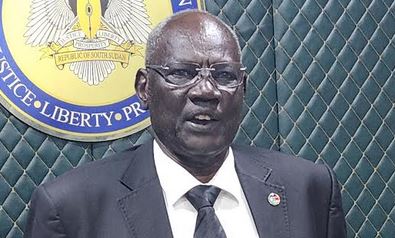South Sudan`s Council of Ministers on Friday unveiled a plan to construct a new oil refinery valued at USD 3 billion in Tharjiath in the oil-producing Unity State.
Addressing reporters shortly after the cabinet meeting chaired by President Salva Kiir in Juba, Information Minister Michael Makuei Lueth said there is already an existing oil refinery in Tharjiath but its capacity is small and lacks the road connectivity to transport products to the market. He added the new refinery will cater to the fuel needs of the country.
“As you know very well, there is already a refinery there but it is small, it is not serving that much so there is a proposal for the construction of a new refinery and that new refinery will be valued at the sum of 3 billion dollars and this will be owned by 30 percent Nilepet and 70 percent another company called Quad Layer Holdings,” he revealed.
He said Quad Layer Holdings will also construct roads to the refinery to ensure that the fuel products reach the market.
According to Makuei, the contracted company p will finance the entire project through a public-private partnership and will be paid after the refinery starts production. He noted after approval of the project by the government, it will be followed by feasibility studies that will also include the capacity of the refinery then the contract between the principles will be signed.
South Sudan, a leading oil-producing country in East Africa, imports fuel from the port of Mombasa in Kenya.
Minister Makuei also revealed that the finance ministry will start paying one month’s salary arrears to civil servants with effect from next Monday. He said the finance minister suggested some measures to control unnecessary expenditure.
“By unnecessary expenditure I meant going on missions which are not necessary, going on medical referrals abroad which are not necessary yet our hospitals here are the best now here in the region and so many other expenses which are uncalled for,” he said. “So, we need to improve on this, transcend them, make proper control, and ensure domestic revenue mobilization. We have to increase the mobilization of revenue, non-oil revenue especially because we have a lot of problems with the oil and up to this moment we have not yet started [pumping].”
“Another issue which is of concern is the withdrawal of Petronas and its shares have not yet been sold up to now but the processes are underway and this could not happen because there is a case pending between Petronas and other partners on the shares in the oil sector, so that case is still pending and it is not addressed and as soon as it is addressed then the issue of Petronas may be resolved,” Makuei added.
The minister said another challenge facing the economy is the shortage of the South Sudanese Pounds because people are hoarding money in their houses because they have lost trust in the banking system and it has led to a shortage of currency in the banking system.
“On the issue of the non-availability of currency in the banks, I am sure you are aware of it, whenever you take your share to any of your banks and you want to draw anything from it you are told there is no liquidity. This is another problem that is facing us now and this is brought about by the behavior of the South Sudanese and the business community,” he said. “People have lost confidence in the banks and as such they tend to hoard their money in their houses and their shops and as such it becomes difficult. In addition to that, people are longing to buy the dollar at any rate in the black market.
Plans are underway to address all this so that the currency is available and they have already started and I think that issue of the lack of liquidity will be addressed soon.”
Makuei also revealed that the finance minister directed by cabinet to go and harmonize two key road projects as there has been some confusion surrounding the 300 km Kapoeta-Torit Road and the Yei-Bangalo-Amadi Road which is 270 km and estimated to cost around USD 1.65 billion.
“After deliberation, it was clear that there is some confusion in the roads because there are some roads which are already taken over by the World Bank and are under construction,” he explained. “They have been repeated by the roads ministry which had its own plan which was presented earlier to the ministry of finance but they did not thereafter coordinate with the finance ministry and the finance minister had to make a presentation.”
“Meanwhile the Ministry of Roads had already changed its program so the whole thing was returned, so, it was decided that the Ministry of Finance and the Ministry of Roads and Bridges should go and harmonize and bring in a document,” Makuei added.




